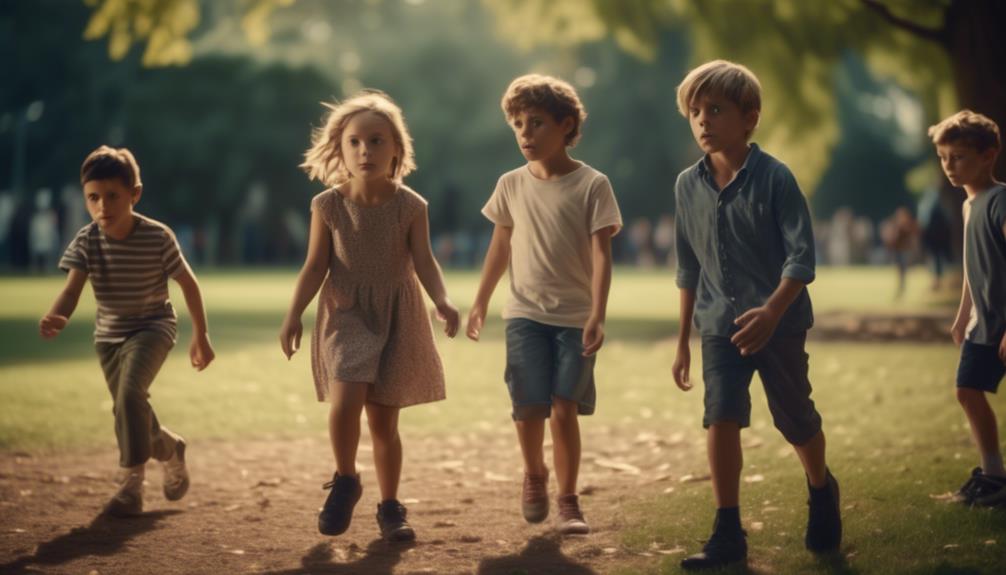When Should You Worry About Social Milestones?

You should start worrying about social milestones if your child is consistently not meeting typical milestones for their age. This includes having difficulty forming relationships or engaging in social interactions.
If you notice these signs, it may be time to seek further evaluation and support.
Key Takeaways
- Social milestones are important indicators of a child's social growth and development.
- Understanding social milestones can help determine if early intervention is necessary.
- Early intervention supports children in navigating social situations and building relationships.
- Seeking guidance from professionals can provide valuable support and resources for addressing delays in social milestones.
Understanding Social Milestones
If you're wondering when to worry about your child's social development, understanding social milestones is key. Recognizing these milestones can provide valuable insights into your child's social growth and help you determine if early intervention or social skills training is necessary.
Social milestones refer to the skills and behaviors that children typically develop at specific ages. These milestones include things like making eye contact, responding to their name, engaging in turn-taking during play, and showing empathy towards others. By understanding these milestones, you can gauge whether your child is progressing at a typical rate or if they may need some additional support.
Early intervention is crucial when it comes to addressing any concerns about your child's social development. The earlier you can identify any potential difficulties, the better equipped you'll be to provide the necessary support and interventions. Social skills training, for example, can help children develop the skills they need to navigate social situations, build relationships, and communicate effectively.
Typical Social Milestones by Age
As your child grows and develops, it's helpful to have an understanding of the typical social milestones they may reach at different ages. Social development plays a crucial role in a child's overall well-being and ability to navigate the world around them. While every child is unique and may reach these milestones at their own pace, having a general idea of what to expect can be reassuring.
During the first year of life, babies begin to show an interest in others and engage in simple social interactions. They may smile, babble, and respond to their caregivers' voices and facial expressions.
By the age of two, children typically start to engage in parallel play, where they play alongside other children, but not necessarily with them. They may also begin to use simple words to communicate their needs and wants.
Around the age of three, children often start to engage in more interactive play with their peers, take turns, and share toys. They also begin to show empathy and understand basic social rules.
As they grow older, they develop more complex social skills, such as making and maintaining friendships, understanding others' perspectives, and resolving conflicts.
It's important to remember that every child develops at their own pace, and there's a wide range of what's considered typical. However, if you notice significant delays or deviations from typical social development, early intervention can be beneficial. Seeking guidance from a pediatrician or early childhood specialist can provide valuable support and resources to help your child thrive socially.
Signs of Delayed Social Development
Keep an eye out for these subtle cues that may indicate delayed social development in your child. It's important to remember that every child develops at their own pace, but if you notice any of these signs, it may be worth exploring further. Here are some red flags to watch for:
| Signs of Delayed Social Development | Intervention Strategies |
|---|---|
| Difficulty making eye contact | Encourage eye contact during conversations and playtime |
| Lack of interest in interacting with peers | Arrange playdates and encourage social interactions |
| Trouble understanding social cues | Role-play social situations and provide clear explanations |
| Difficulty taking turns or sharing | Teach turn-taking and sharing through games and activities |
| Overly aggressive behavior | Teach appropriate ways to express anger and resolve conflicts |
| Difficulty initiating or maintaining conversations | Practice conversational skills and provide opportunities for socializing |
If you notice that your child exhibits several of these signs or if their social skills seem significantly delayed compared to their peers, it may be beneficial to seek professional guidance. Early intervention strategies can help address these delays and support your child's social development. Remember, every child is unique, and with the right support and guidance, they can thrive socially.
Factors That Can Impact Social Milestones
So, you want to know about the factors that can impact social milestones? Well, let me break it down for you.
Developmental delays can play a big role in how quickly or slowly someone reaches these milestones.
But it's not just about biology – the social environment and influences also have a significant impact.
Developmental Delays and Milestones
If you notice that your child isn't reaching social milestones at the expected time, it can be helpful to explore the factors that may be impacting their development.
Understanding developmental delays is crucial in promoting healthy development. There are various factors that can contribute to these delays.
Some children may have a genetic predisposition to certain developmental challenges, while others may have experienced trauma or adverse experiences that affect their social skills.
Additionally, environmental factors such as limited opportunities for social interactions or a lack of positive role models can also play a role.
It's important to remember that every child develops at their own pace, but if you have concerns about your child's social milestones, don't hesitate to seek guidance from a healthcare professional. They can provide valuable insights and recommend appropriate interventions to support your child's progress.
Social Environment and Influences
In order to understand the factors that can impact social milestones, it's important to consider the social environment and influences that shape a child's development. The people and culture around a child can greatly influence their social skills and behavior. Here are some key factors to consider:
- Peer pressure: The desire to fit in and be accepted by peers can influence a child's social behavior. It's important to teach children how to navigate peer pressure and make their own decisions.
- Cultural influences: Different cultures have different social norms and expectations. Understanding and embracing cultural diversity can help children develop a more inclusive and tolerant mindset.
- Family dynamics: The way a child interacts with their family members can impact their social skills. Positive and healthy family relationships can foster good social development.
- Media and technology: The constant exposure to media and technology can shape a child's social interactions. It's important to monitor and guide their media consumption to ensure healthy social development.
- Community involvement: Being involved in positive community activities can provide children with opportunities to develop social skills and empathy.
When to Be Concerned About Social Milestones
Sometimes, it's natural to wonder if your child is hitting their social milestones at the right pace. As a parent, you want the best for your child, and ensuring their social development is on track is important. While every child develops at their own pace, there are certain red flags that may indicate a need for early intervention. It's crucial to identify these red flags and seek help if necessary.
To help you better understand the signs to look out for, here's a table outlining some potential concerns related to social milestones:
| Red Flags | Possible Concerns |
|---|---|
| Lack of eye contact | Difficulty forming relationships |
| Limited social interactions | Trouble understanding social cues |
| Difficulty sharing or taking turns | Challenges with empathy and perspective-taking |
| Difficulty making and maintaining friendships | Struggles with communication and social skills |
Seeking Professional Evaluation and Support
So you've noticed that your child is struggling with social milestones and you're not sure what to do next.
Seeking professional evaluation and support can provide you with a wealth of benefits. Not only will it give you a clearer understanding of your child's needs, but it will also equip you with the tools and strategies to help them navigate social situations more effectively.
Professional Evaluation Benefits
If you're ever unsure about your child's social milestones, seeking professional evaluation and support can provide valuable insights and guidance. The professional evaluation process comes with numerous benefits that can help you better understand your child's development and address any concerns you may have. Here are five reasons why seeking help from professionals is beneficial:
- Expertise: Professionals have the knowledge and experience to accurately assess your child's social skills and milestones.
- Objective viewpoint: Professionals can provide an unbiased perspective, free from personal biases or emotions.
- Early intervention: Early identification of any developmental delays or issues can lead to early intervention and better outcomes.
- Individualized support: Professionals can tailor their guidance and recommendations to meet your child's unique needs.
- Peace of mind: Seeking professional help can bring you a sense of relief, knowing that you're taking the necessary steps to support your child's social development.
Importance of Seeking Support
When it comes to your child's social development, seeking professional evaluation and support is crucial for their overall well-being and future success. Sometimes, as parents, we may feel overwhelmed or unsure of what steps to take when our child is struggling with social milestones. That's where seeking therapy and utilizing community resources can make a world of difference.
By seeking therapy, you're giving your child the opportunity to work with trained professionals who specialize in social development. They can assess your child's specific needs, provide guidance, and offer strategies to help them navigate social situations more effectively. Therapy can also provide a safe and supportive environment for your child to express their emotions and build essential social skills.
Additionally, community resources such as support groups, workshops, and educational programs can offer valuable information and tools for both you and your child. These resources can provide a network of support and connect you with others who may be going through similar experiences.
Promoting Healthy Social Development
To promote healthy social development, it's important to create an environment that encourages positive interactions and fosters meaningful connections. As you support others in their journey towards healthy social development, keep in mind the following strategies:
- Encourage play: Play is a crucial part of social development. Encourage children to engage in imaginative and cooperative play, as it helps them learn important social skills such as sharing, taking turns, and resolving conflicts.
- Provide opportunities for social interaction: Create opportunities for individuals to interact with others in different settings. This could include playdates, group activities, or volunteering in the community. By exposing them to diverse social situations, you help them develop empathy, communication skills, and a sense of belonging.
- Teach social skills explicitly: Some individuals may require explicit instruction to learn social skills. Break down social skills into smaller steps and teach them through modeling, role-playing, and positive reinforcement. This can help them understand social cues, initiate conversations, and navigate social situations more effectively.
- Foster a supportive and inclusive environment: Create an environment where individuals feel safe to express themselves and are accepted for who they are. Foster an atmosphere of respect, kindness, and empathy, promoting healthy social connections and boosting self-esteem.
- Seek early intervention when needed: If you notice significant delays or difficulties in social development, seek early intervention services. The earlier you address these challenges, the better the chances for positive outcomes and improved social skills.
Frequently Asked Questions
Are There Any Specific Social Milestones That Toddlers Should Achieve in Their Second Year of Life?
In their second year of life, toddlers should achieve specific social milestones. It's important to keep an eye on their progress, but don't stress too much. Every child develops at their own pace.
How Can Parents Support Healthy Social Development in Their Children?
To support healthy social development in your children, try these parenting tips. Encourage them to engage with others, teach them empathy and kindness, and foster friendships. Remember, building social skills takes time.
What Are Some Red Flags That May Indicate a Delay in Social Development?
If you notice red flags or delay indicators in your child's social development, it's important not to panic. Stay observant, keep supporting them, and consult with professionals if you have concerns.
Are There Any Cultural or Environmental Factors That Can Impact Social Milestones?
Cultural influences and the impact of social media can affect social milestones. It's important to be aware of how these factors might shape your child's development and seek support if needed.
At What Age Should Parents Seek Professional Evaluation if They Are Concerned About Their Child's Social Development?
If you're concerned about your child's social development, it's important to seek professional evaluation within the appropriate age range. Early intervention can make a big difference in helping them thrive.











